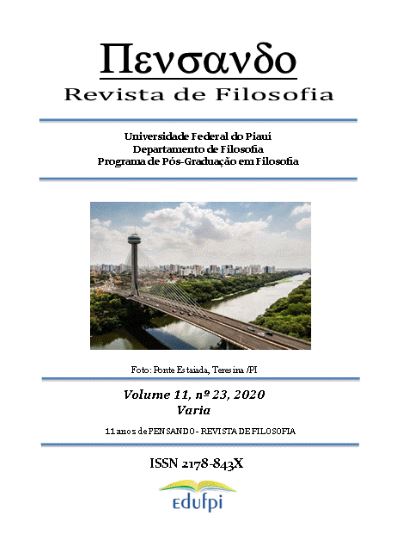PASADO, PRESENTE Y FUTURO DE LA INFORMACIÓN: DE LAS MÁQUINAS QUE PIENSAN A LA APUESTA ACELERACIONISTA
DOI:
https://doi.org/10.26694/pensando.v11i23.11096Keywords:
Información, Inteligencia Artificial, Computación, MáquinasAbstract
En este trabajo proponemos un recorrido por algunas de las múltiples facetas que la noción de información tuvo, tiene y tendrá en la discusión de distintos problemas filosóficos, poniendo especial atención a aquellos que han preocupado a los filósofos de la técnica, de la computación y, en particular, de la filosofía de la inteligencia artificial. En el camino prestamos atención a las oportunidades, a los desafíos y también a los peligros que las nuevas tecnologías de la información nos presentan como individuos, como sociedad y como cultura. Estas tecnologías crean nuevos espacios de interacción que ponen en jaque distintas concepciones del mundo, pero también aportan conceptos que deben incorporarse al acervo filosófico, no sólo porque pueden aportar luz a viejas discusiones sino porque consideramos que es necesaria la reflexión filosófica para orientar el curso y las consecuencias de tecnologías que, por su propia definición, intentan ocupar “espacios humanos”.
References
BLANCO, Javier y GARCÍA, Pío, “Efectividad y programabilidad”, en BERTI, Agustín y RE, Anahí (editores). Actas del VII Coloquio de Filosofía de la Técnica y del I Conversatorio Internacional sobre Tecnoestética y Sensorium Contemporáneo: Tecnología, política y cultura: arte/literatura/diseño/tecnologías. Córdoba: Editorial FFyH, 2017, pp. 125-134.
CAFFENTZIS, George. En letras de sangre y fuego: Trabajo, máquinas y las crisis del capitalismo. Buenos Aires: Tinta Limón, 2020.
DAVIS, Martin. The universal computer: The road from Leibniz to Turing. New York: Norton, 2000, p. 143.
DESCARTES, René. Discours de la méthode pour bien conduire sa raison et chercher la vérité dans les sciences, 1637.
DUPUY, Jean-Pierre. On the Origins of Cognitive Science: The Mechanization of the Mind. Cambridge, MA: Mit Press, 2009.
ERSHOV, Andrei, “Abstract computability on algebraic structures”. En ERSHOV, Andrey y KNUTH, Donald (Eds.). Algorithms in Modern Mathematics and Computer Science. Lecture Notes in Computer Science (v. 122). Berlin; Heidelberg: Springer, 1981, pp. 397-420.
FENSTAD, J. General Recursion Theory: An Axiomatic Approach. Perspectives in Mathematical Logic (v. 10). Berlin: Springer Verlag, 1980.
GANDY, Robin, “Church’s Thesis and Principles for Mechanisms”. En BARWISE, Jon; KEISLER, H. Jerome; KUNEN, Kenneth (Eds.), The Kleene Symposium. Studies in Logic and the Foundations of Mathematics (v. 101). Elsevier, 1980, pp. 123–148.
JOLER, Vladan y PASQUINELLI, Matteo, “The nooscope manifested”, 2020. https://nooscope.ai
LAND, Nick. “Colapso”. En AVANESSIAN, Armen y REIS, Mauro (comps.). Aceleracionismo: Estrategias para una transición hacia el poscapitalismo. Buenos Aires: Caja Negra, 2019, p. 53.
LAND, Nick. “Crítica del miserabilismo transcendental”. En AVANESSIAN, Armen y REIS, Mauro (comps.). Aceleracionismo: Estrategias para una transición hacia el poscapitalismo. Buenos Aires: Caja Negra, 2019, p. 67.
MARCUS, Gary y DAVIS, Ernes. Rebooting AI. New York: Pantheon Books, 2019.
NEGRI, Antonio. “Reflexiones sobre el ‘Manifiesto por una política aceleracionista’”. En En AVANESSIAN, Armen y REIS, Mauro (comps.). Aceleracionismo: Estrategias para una transición hacia el poscapitalismo. Buenos Aires: Caja Negra, 2019.
SADIN, Eric. La Humanidad Aumentada. La administración digital del mundo. Caja Negra, 2017.
SHAPIRO, Stewart. “Effectiveness”. En VAN BENTHEM, Johan; HEINZMAN, Gerhard; REBUSHI, Manuel y VISSER, Henk (editores). The Age of Alternative Logics. Springer, 2006, p. 37–49.
SLOMAN, Aaron. The Computer Revolution in Philosophy: Philosophy, Science, and Models of Mind. Atlantic Highlands, NJ: Humanities Press, 1978.
SMITH, Brian C, The Promise of Artificial Intelligence. Reckoning and Judgment. Cambridge, MA: The MIT Press, 2019.
TERRANOVA, Tiziana (2019). “Red stack attack! Algoritmos, capital y la automatización del común”. En AVANESSIAN, Armen y REIS, Mauro (comps.). Aceleracionismo: Estrategias para una transición hacia el poscapitalismo. Buenos Aires: Caja Negra, 2019.
TURING, Alan M. “Computing Machinery and Intelligence”. En Mind, v. 59, n. October, 1950, pp. 433–60.
TURING, Alan M. Can digital computers think? BBC Radio Broadcast, 15 de mayo de 1951. En COPELAND, Jack. The Essential Turing. Clarendon Press, 2004, pp. 662-3.
TURING, Alan M., Lecture to the London Mathematical Society on 20 february 1947. En COOPER, S. Barry; LEEUWEN, J. van (Eds.), Alan Turing: His Work and Impact. Waltham, MA; Kidlington, Oxford: Elsevier Science, 2013, p. 496.
TURING, Alan. “On Computable Numbers, with an Application to the Entscheidungsproblem”. En Proceedings of the London Mathematical Society, v. 42, 1936, pp. 230–65.
WIENER, Norbert, The Human Use of Human Beings: Cybernetics and Society. Avon Books, 1954, p. 180. Traducido al español como: WIENER, Norbert, Cibernética y sociedad, Mexico: Consejo Nacional de Ciencia y Tecnología, 1958.

























